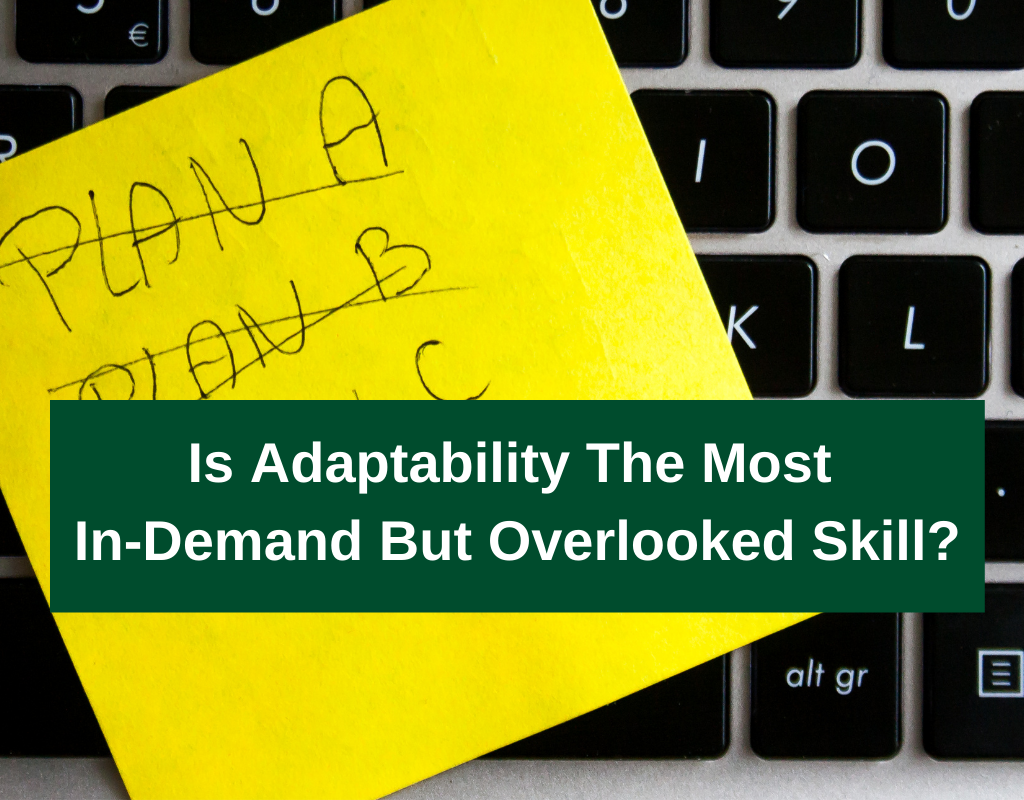2020 has shown how vital it is for organisations to be able to respond to change. Innovation and transformation have been the order of the day for businesses. However, for businesses to adopt an agile approach to change, they need a team that has the skillset that is able to respond, innovate and adapt at speed.
As Charles Darwin says, “It is not the strongest of the species that survive, nor the most intelligent, but the one most responsive to change.”
In the theory of evolution, it is those that can adapt that will survive. When building an organisation that thrives, it is essential to have a team that is willing and ready to adapt. So, if adaptability is critical for the strongest organisations to succeed, then it may suggest that this is a skill to seek out during the recruitment stage.
What Is Adaptability?
Adaptability is considered an emotional intelligence soft skill. It means that individuals are able to change their behaviours, actions and the way they work to suit new situations. Furthermore, adaptable people will not just change to suit their new environments, but they are willing to approach the unknown with positivity, confidence and determinedness.
Talent may define their adaptability as being a forward-thinker or a lifelong learner. Candidates will usually be able to demonstrate a balance of curiosity and control when it comes to goals. For example, they may be committed to their training but also be looking at other avenues that they need to explore. Their mindset may be beyond their current position and be thinking about new situations that they can thrive in.
Why Is Adaptability So Important?
A PWC study found that 63% of CEOs are unable to find and recruit talent that can adapt to the requirements of the business. Furthermore, research by Barclays Lifeskills shows that 60% of employers believe that adaptability has become more important this decade than in the past.
Interestingly, research suggests that around 44% of employees do not recognise adaptability as a skill they possess. Furthermore, only 15% list adaptability on their CV; this is despite many employers seeing adaptability as a critical work skill.
While employers see this as a vital skill, research suggests that just 8% of employers actually offer training in this skill, suggesting there may be a discord between what employers look for and what they are willing to develop in-house.
Responsiveness To Change In A Post-COVID World
2020 has been a year where it has been essential to respond to change and adapt to suit almost every environment. Whether in or out of the workplace, people have faced cancelled plans, disrupted routines, closures, stress and upheaval.
However, despite the overwhelming negatives, some organisations have used their innovation and flexibility to create a more adaptable future. Many businesses have had to lose sight of their one-, two- and five-year plans. It has never seemed so important for individuals and businesses to ride this challenge like a wave, rather than desperately try to swim against the tide.
While many people have understandably struggled with the unprecedented events of the year, the ability to transition has been admirable. From small businesses to huge-scale operations, many have been able to pivot quickly to offer remote working and diversify their portfolio to meet the changing demands of their customers.
In some cases, this year has served as a wake-up call that unexpected shifts are inevitable and that being able to recover and capitalise on change will help employees and businesses to be in the best possible shape to thrive.
Cultivating Adaptability
There are ways that organisations and individuals can cultivate this skill and become more adaptable by nature.
Understand A Rapidly Changing Landscape
Technology and digitisation have shown the difference that mere months can make to the way we work. Traditional forecasting can be impossible when the landscape is so unpredictable. With this in mind, it is essential to keep an ear to the ground and watch carefully what competitors, the industry or overall market is doing.
When you can begin the see the landscape unfolding and become aware of the demands ahead, you can become better prepared to make the rapid changes that are needed.
Experiment Quickly
Organisations now have to adopt new strategies and take on fresh ideas at a rapid rate. For a long time, the focus for businesses was to perfect their offering. Now, it’s a focus of trialling, experimenting and learning processes and strategies that can be successful in an interconnected world.
Unlocking Your Greatest Resources
With a business centred on adaptability, it is vital to have a team ready to respond to change. With this in mind, the focus on ‘job role’ may no longer apply. Instead, organisations may be looking for talent that can step outside of their comfort zone when it comes to skills and be willing to learn new skills, try new processes and interact with the organisation differently.
Businesses and employees will need to be able to read the signals of change and adapt accordingly, even if that means going beyond the boundaries of the job description.
However, in order to do this, it is vital to look for the talent that has great potential in solving problems and is will the grasp new opportunities while reacting positively to the changing landscape, context and competition.
How To Hire Adaptability
So often, screening candidates means concentrating on the candidate’s ability to conform to the job description. However, with this, you are assessing their ability to work in a role that is in the past rather than the role of the future.
It may, instead, be a better idea, to focus on what a candidate can do in the future and look into the skills of creativity, digital awareness, problem-solving and strategic analysis to create a responsive ecosystem in your workplace and an adaptable organisation that is optimistic about change.







